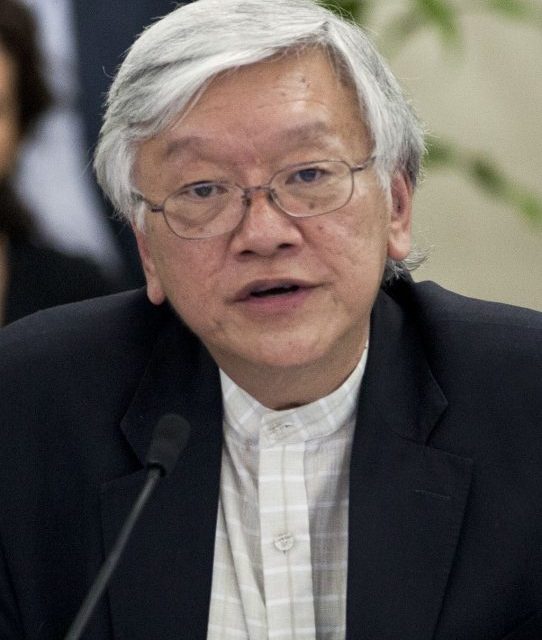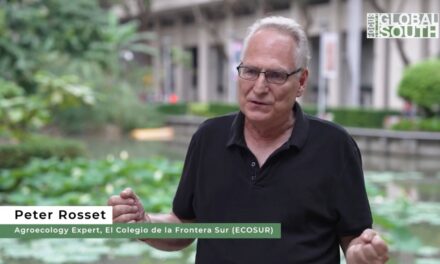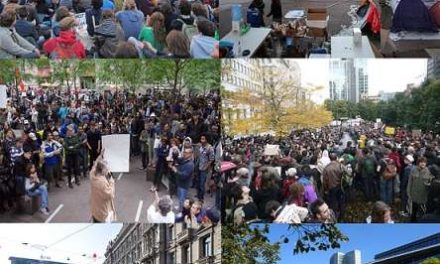by Walden Bello
When future students of North-South relations look back to the history of the last 35 years or so, among the key figures they will most likely mark as one of the most decisive in shaping the course of events is one who did not owe his power to a position in government or business.
Martin Khor, who passed away recently in Penang, Malaysia, at the age of 68, was present in almost every area of North-South confrontation, from intellectual property rights to the role of multilateral institutions, trade, biodiversity, finance, and climate change. He represented the reemergence in the late 1980s of an actor that had last been seen during the glory days of the Communist International in the 1920s: the borderless activist.
Reacting to his passing, Lori Wallach, director of Public Citizen’s Global Trade Watch, said, “Almost every peak memory I have of each battlefront of fighting corporate-rigged globalization during the last 30 years includes Martin, because he was central to each fight.”
Globalization’s Antithesis
Martin the phenomenon was, in a very real sense, produced by globalization, and he emerged as the antithesis to it.
His rise to prominence began in the mid-1980s and early 1990s, when transnational capital moved its focus from restructuring domestic economies along neoliberal lines through the World Bank and the International Monetary Fund to reshaping the rules of international trade via the World Trade Organization. Martin caught the drift of events early on and realized that opposing corporate-driven globalization would necessitate a resistance that also needed to be global.
Martin began his work from his twin organizational bases in Penang, the Consumer Association of Penang and the Third World Network (TWN). I first met him, in fact, when he invited me to attend several of the gatherings the TWN hosted in the late 1980s, meetings that tackled issues ranging from the monopolistic practices of the pharmaceutical monopoly to “structural adjustment” of developing country economies by the World Bank to the ravaging of tropical forests.
These meetings, which saw intellectual exchange result in concrete agreements to work together, became the means by which an informal global network was created that brought together intellectuals, activists, and sympathetic government officials from both the global North and the global South. Even before thinkers like Michael Hardt and Antonio Negri theorized the decentralized, non-hierarchical network as the response to global capital, Martin was putting its elements in place. Of course, it was not only him that was building international networks during this period, but he was a vital nodal point of this activity.
Striking at the Enemy’s Weak Points
Martin was clear about the enemy, and this was corporate-driven globalization. He was also clear about his fundamental goal: to ensure that the developing world, or global South, was protected from the corporate assault.
“Martin consistently brought the Third World perspective to all global issues, from trade to climate,” observes Vandana Shiva, the Indian ecofeminist and recipient of the Right Livelihood Award. The aim of his strategy of networking was to create a defense in depth linking developing country governments to international civil society while striking at the weak points of the enemy.
These points of vulnerability were the multilateral institutions — the World Bank, IMF, and WTO — that served as the political canopy of global capital. These institutions were tasked with rewriting international economic rules in favor of capital and obtaining the global “consensus,” to use Gramsci’s term, to make them legitimate and effective. The niche that he forged for himself was to bring the pressure of international civil society and developing country governments to bear on multilateral institutions and feed information on what these agencies were concocting to the former.
This pivotal position showed its value in the struggle against the Multilateral Agreement on Investment (MAI) in the late nineties. The MAI was a corporate attempt via the Organization for Economic Cooperation and Development (OECD), also known as the “club of rich countries,” to knock down restrictions to investment not only among its members but also in developing countries they had relations with.
Shortly before news of the secret agreement leaked out, Martin, along with a number of other prominent activists — among them the anti-capitalist author Jerry Mander, Right Livelihood Award recipient Maude Barlow of the Council of Canadians, indigenous leader Victoria Tauli Corpuz, and Chilean environmentalist Sara Larrain — had formed the International Forum on Globalization (IFG). It was in this transnational formation that Martin revealed the drastic implications of the secret accord for the global South and, acting on his urgent warning, the IFG led what became a global campaign to sink the MAI.
The global mobilization stunned technocrats in the North and killed the agreement. The surprising victory, which generated wind in the sails of the rising anti-globalization movement, “would not have happened but for Martin’s early warning, constant guidance, and relentless direct advocacy,” says Public Citizen’s Wallach.
Seattle
The fight over the MAI turned out, in fact, to be a dress rehearsal for a bigger battle, one provoked by the push of the powerful countries behind the World Trade Organization, which was formed in 1995, to expand its powers to control areas beyond trade like investment and competition policy and override environmental and labor laws in the name of free trade.
Developing country governments gasped at the ambition of the TNC-controlled trade body since they had barely begun implementing the changes in their trade laws mandated by the “Uruguay Round” of Trade Negotiations that had set up the WTO. The Third Ministerial Meeting of the WTO in Seattle in late November 1999 turned out to be the perfect storm bringing together the disparate sectors negatively impacted on by the corporate push for a new trade round, and at the center of that storm was Martin.
It was in Seattle that Martin perfected the so-called “inside-outside” strategy, which involved him and others participating in the official discussions to help block pro-corporate initiatives while also assisting in the mobilization of activists outside the convention center by holding teach-ins to inform people about what was at stake.
In a 20-minute speech at an IFG teach-in attended by hundreds that was laced with humor and interrupted by frequent applause, he stripped neutrally worded issues such as” trade-related intellectual property rights,” “trade related investment measures,” and “special and differential treatment” to their essence. He damned the lack of transparency and democratic decision-making in the official negotiations, saying, “The kind of transparency and participation which is being offered are, more information and more symposiums, but no real participation not only for us. Not only that the parliamentarians are not really invited, but even the ministers and the senior officials themselves — the majority of them — are not invited to the real negotiations.”
Then, with an uncanny sense of what was emerging as a possibility, he told his audience:
“So we have before us, in the next few days, a historic event. Either they will cook up a consensus in four days…Or, there really will be no new round and turnaround. We the citizens may have some influence on that. It depends on the messages we are going to put forward when we go on the streets and when we talk to the media. A lot of it will depend on what happens inside there irrespective of us… But let us spend the next four or five days exchanging information and analysis among ourselves, trying to influence as much as possible, showing the world that we care and because we care we are protesting. And then spend the next few years really fighting. Either fighting the WTO or for a better WTO if that is possible.”
The Seattle Ministerial collapsed owing to the synergy between the mass mobilization of some 50,000 people in the streets and the resistance to further liberalization of their economies by the delegates from developing countries in the negotiations, and Martin was central to making that synergy happen.
The debacle was one from which the WTO never really recovered.
Leadership Style
Martin’s leadership style would merit a study by itself.
Leadership via influence and informal authority, not formally acquired and exercised power, was his currency, and it was informal authority that was accumulated through his unique combination of analytical acuity and detailed mastery of the issues, an ability to translate superficially complex texts into understandable terms, a style of gently encouraging people to deliver their best — and, at all times, not taking one’s eyes away from the ball.
As his speech at the IFG Seattle teach-in demonstrated, Martin had a unique ability to fire up a crowd. His IFG colleague Victor Menotti recalled how at the organization’s teach-in before the 2002 World Summit on Sustainable Development in Johannesburg, “he had folks from the townships in a call-and-response cadence within twelve seconds of starting his short speech… I actually clocked it.”
Developing country officials and negotiators meeting him, according to Aileen Kwa, a colleague at the South Center, were “not always the easiest audiences to sway, yet without fail, he was able to win them over” with his technical command of the issues, his ability to break them down into simple terms, and his congenial personality.
Anuradha Mittal, executive director of the Oakland Institute observed, “He had this ability to make you feel special — so you were ready to take on the world, like him.”
One of Martin’s strengths, according to Pablo Solon, former ambassador of Bolivia to the United Nations, was not only his ability to “ferret out the devil that was in the detail of climate, trade, and finance texts that were being discussed in the UN,” but his grasp of what Michel Foucault called the power of discourse — that is, that discourse is structured by power relations and structures power relations.
The more technical and technocratic the language, the more it veiled power relations. Martin saw as his task deconstructing the text of multilateral agreements and unveiling the real relations they concealed. This made people like Pascal Lamy of France and Mike Moore of New Zealand, two former directors general of the WTO, extremely uneasy in face to face combat with him. While they droned on loftily about the need for rules to create “an even playing field” for developed and developing countries, Martin would bring them back to earth with his witty repartee, “Yes, you want an even playing field where you have a basketball team of six footers playing against one of four footers.”
Climate Politics
The climate became Martin’s principal battlefront after the WTO became an increasingly unworkable instrument for global trade liberalization in the mid-2000s owing to civil society and developing country resistance. In this area, his influence was just as great as in trade.
One of Martin’s contributions to the climate debate was to popularize what came to be called “negative emissions.”
“He personally turned climate politics on its head at the 2007 Bali COP (Conference of Parties),” IFG’s Menotti recounts. Developing countries…
“were almost ready to accept developed nations’ commitment to cut emissions by only 80 percent. It still sounds like a lot but he explained to everyone from campaigners to ministers that this was not nearly enough when historical emissions and other often-ignored factors were included. The world now thinks in terms of the North having to do ‘negative emissions,’ and that’s only part of how he helped to align everyone’s thinking on environment and development agendas, which was also a pretty painful process for some people especially in the North.”
Martin moved his base of operations from Penang to Geneva in 2009, when he accepted an offer to head up the South Centre, an intergovernmental organization of developing countries focusing on North-South trade and development issues, especially as they related to multilateral negotiations. While he led in expanding the Centre’s engagements in multiple fronts, his primary concern was making sure the global South was not short-changed in the climate negotiations that increasingly dominated North-South relations.
According to his Geneva-based colleagues Yilmaz Akyuz and Richard Kozul-Wright, “Martin was a strong critic of tighter intellectual property rights, particularly through trade agreements, that restricted the transfer of the technologies developing countries needed to help in the fight against rising global temperatures and to mitigate the climate damage they were already experiencing.”
His voice was also an important one in discrediting “a naïve belief in market-friendly solutions to the climate challenge.” Another former colleague at the Centre, Vice Yu, added that Martin stood for “a development and environmental equity-oriented approach to the climate change problematique,” and that he fought to have as much of this as possible reflected in the historic 2015 Paris Climate Declaration.
Tensions among Friends
As with all activists with strong convictions, Martin was not without disagreements with some of his allies. Climate strategy was one area of tension. His perspective on how to approach the climate crisis was summed up by Institute for Policy Studies director John Cavanagh: “The Global South, Martin argued, should have space to ‘develop’ using more emissions as the world overall cut back on emissions, while the North should adopt more rapid measures to end emissions.”
While his intent was most likely different, to many climate activists in the North as well as to some in the South, this came across as a plea for leniency for some notorious developing country climate polluters, namely India and China. Also, there were those who thought he invested great importance on supporting developing country governments while paying insufficient attention to conflicts between these governments and their citizens.
These were, however, differences among comrades. As Shalmali Guttal, executive director of Focus on the Global South, put it in her eulogy to Martin, “Martin may not have seen eye to eye with some of his allies on some tactical issues, but there was never any doubt in the minds of the latter that their strategic objectives were the same and they appreciated his role as a pivotal leader in this common struggle.”
Broader Vision
While defense of developing country interests on various fronts was Martin’s abiding objective, what was his vision for a better world and how was one to get there?
IPS’s Cavanagh discerned Martin operating with two paradigms:
“The first paradigm involves the choice to work in the system of globalization in which we feel we are trapped. If we do work within that system, we begin by asking: ‘Are the rules of the game fair?’ In this paradigm, we ‘fight for the reform of the rules of the game.’ But, Martin argued, we need to simultaneously fight for a second paradigm ‘because in 20 to 30 years the whole system will blow up anyway. So, in the second paradigm, we work for Gandhian-style, community-based, self-reliant family units of production, trading mainly with the community and the region and only making occasional exchanges with the rest of the world.’”
At the peak of his influence from his vantage point at the South Centre, Martin was diagnosed with colon cancer in 2015. The next few years, according to his partner and comrade in arms Meena Raman of Friends of the Earth International, were marked by ups and downs as he went from one seemingly successful surgery to another.
He did not cease working until 2018, when he was too ill to continue to direct the South Centre and moved from Geneva to his original activist base in Penang. There the global activist par excellence passed away peacefully on April 1.
With the current global havoc wreaked by COVID-19, Martin’s prediction of the global system blowing up was remarkably prescient. But the pandemic also underlines what it lost with the passing of Martin.
As Rob Davies, former Trade Minister of South Africa put it, “As the world grapples to find a better future after COVID-19, we need more of the likes of Martin Khor.”










